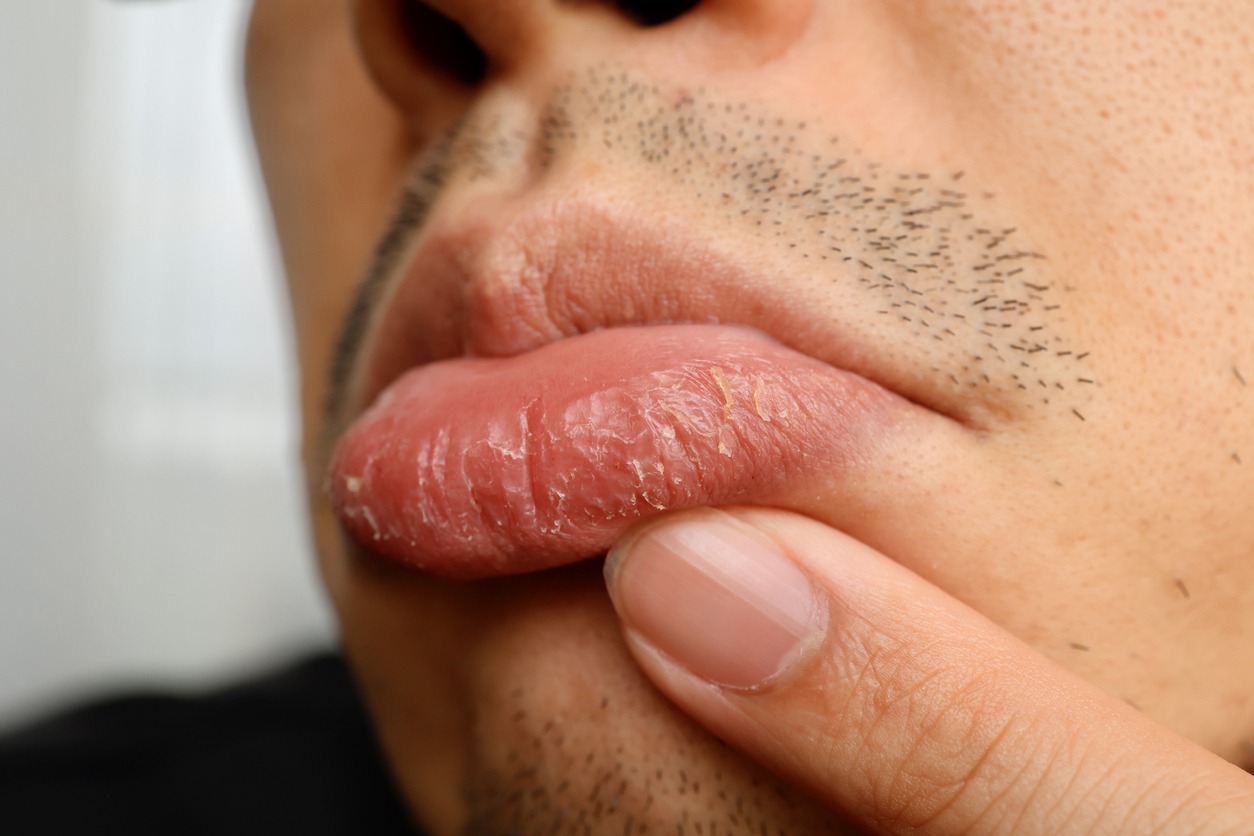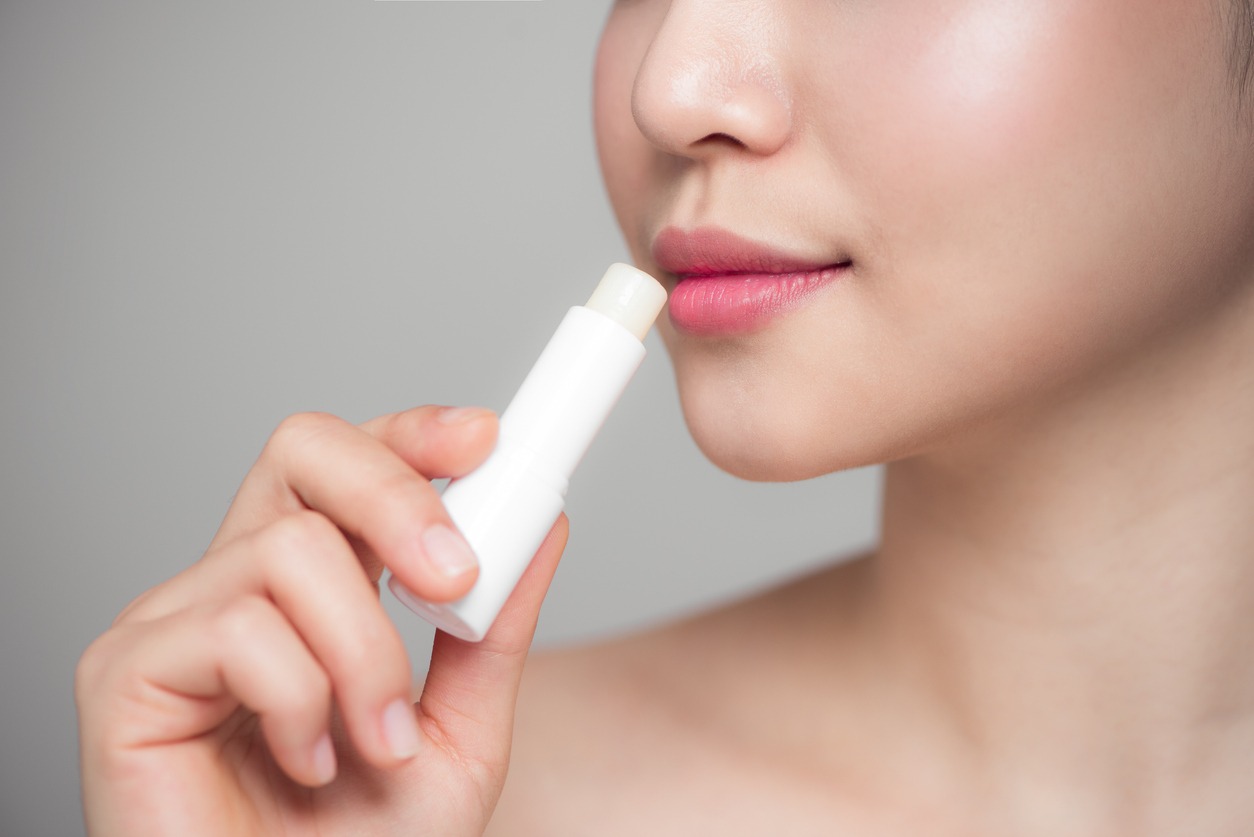Because your lips don’t have any oil glands, their skin is thinner and more sensitive than the skin on the rest of the body. They run the danger of getting dry and chapped as a result. Your lips are more exposed to the elements than the rest of your body and can develop chapped skin through exposure to the sun, dry air, or extreme cold. Cheilitis, the medical term for chapped lips, can result from exposure to an allergen or a medical condition.
Your lips are one of your body’s most sensitive areas since they contain more than a million distinct nerve endings (and are 100 times more sensitive than your fingertips). Due to the lack of a protective barrier, they are significantly more sensitive.
Most common types of cracked lips
- Cheilitis simplex – This is one of the most common types, typically affecting the lower lip, and manifesting as cracked lips, and splits of the lips.
- Eczematous cheilitis – This is an inflammatory or irritated condition of your lips’ skin. Atopic dermatitis is occasionally linked to it. It may result in painfully cracked, scaly, or dry lips. It is an extreme case of chapped lips.
- Angular cheilitis – This is a skin disorder that typically affects the corners of your mouth. It causes uncomfortable, cracking sores. Cold sores and angular cheilitis are frequently confused. Angular cheilitis is not communicable, unlike cold sores. With specific skin creams, medications, or dietary modifications, this issue typically gets better.
- Actinic cheilitis – An abnormal cells condition caused by long-term sun exposure. Your lips develop rough, scaly, discolored patches as a result. Men, persons with fair complexion, people who work outside, and people who live in areas with more intense sunlight are more likely to experience it.
- Drug-induced cheilitis – refers to wounds brought on by the use of drugs, primarily retinoids (such as isotretinoin and acitretin) or other drugs (topical antibiotics, virostatic agents, lip care products, disinfectants, local anesthetics, creams with protection factors, etc.)
Some causes of cracked lips
- Sunburn
- Hot or dry weather
- Licking your lips a lot
- Medication-related side effects or medical diseases (allergies, thyroid problems, some autoimmune illnesses, etc.).
- Vitamin deficiency
- Dehydration
Ingredients to stay away from if you have chapped lips
Stop using lip creams that contain any of the following to help in the healing of chapped lips:
- Eucalyptus – Eucalyptus oil is a sensitive component that can lead to allergic responses or skin rashes. It’s dangerous to consume a much of eucalyptus extract. Seizures and even organ failure are possible severe adverse effects if consumed.
- Flavoring – Lips that are dry and chapped may find the flavors of cinnamon, citrus, mint, and peppermint particularly irritating.
- Lanolin – Our skin may experience burning, stinging, redness, or irritation if we have lanolin in our lips.
- Menthol – This chemical may give a cooling effect immediately, but it can also irritate the skin. In rare instances, they even remove the skin’s outer layers, leaving your lips exposed to the elements and without protection.
- Phenol (or phenyl) – The skin, eyes, nose, throat, and neurological system may get irritated after being exposed to phenol. Weight loss, lack of energy, fatigue, soreness in the muscles, and weakness are a few signs of phenol exposure. Skin burns, tremor, convulsions, twitching, and liver and/or kidney damage can all result from severe exposure.
- Propyl gallate – It is a skin activator and an irritant to the skin and eyes. Inhalation exposure is a risk because it is possible.
- Salicylic acid – Lips can become dry, red, and chapped when taking some medications, including antihistamines, chemotherapy, diuretics, and topical acne medications containing salicylic acid or benzoyl peroxide.
Ingredients that are effective for curing chapped lips
Some components can irritate cracked, dry lips, while others can help healing. Dermatologists advise choosing chapped lip treatments that contain one or more of the following ingredients.
- Castor seed oil
- Ceramides
- Dimethicone
- Hemp seed oil
- Mineral oil
- Petrolatum
- Shea butter
- Ingredients that block the sun’s rays, such zinc oxide or titanium oxide
- White petroleum jelly
Utilizing hypoallergenic and fragrance-free products is also helpful.
Tips on dealing with cracked lips
1. Apply a non-irritating lip moisturizer or balm multiple times throughout the day and before sleeping at night. Consider applying a thick ointment, such as white petroleum jelly, if your lips are severely dry and cracked. Longer than waxes or oils, ointment seals in the water.
2. Before going outside, apply a lip balm with an SPF of 30 or higher that is not irritating. It is important to protect your lips from the sun even in the winter. Cold sores may develop because of the sun’s increased ability to burn dry, chapped lips. Use a lip balm with SPF 30 or higher and one (or both) of these sun-protective components to shield dry, chapped lips from the sun:
- Titanium oxide
- Zinc oxide
Apply the lip balm every two hours if you are outside.
3. Take in a lot of water – Keep hydrated since chapped lips are a sign of dehydration.
4. Avoid picking, biting, and lip-licking – It may seem natural to lick one’s lips to moisten them when they are feeling dry but doing so can make the condition worse. Your lips dry out as saliva evaporates. Additionally, picking or biting your lips irritates them and can delay recovery.
5. Keep your lips away from metal objects when handling them – Your lips may become irritated by paperclips, jewelery, and other common metal items.
6. Install a humidifier in your house – If you breathe through your mouth at night, a humidifier in your bedroom can be very useful.
7. Applying aloe vera – The soothing properties of aloe vera on burns and wounds are well documented. It eases any discomfort caused by cracked skin, whether in gel form or as a component of a lip balm. Additionally, it can treat your chapped lips’ minor injuries.
8. Avoid citrus, spice, and salt – You might need to refrain from consuming orange juice, biting into grapefruit slices, or bringing citrus fruits close to your lips. Citruses’ juice is acidic, therefore it can irritate your lips worse. For a period, stay away from foods that are salty or spicy as these foods might also induce inflammation.
You should see results from applying these physicians’ advice for chapped lips in two to three weeks. Apply lip balm whenever it is dry outside or inside to keep your lips from becoming chapped again.
Chapped lips can be treated naturally in several ways. Some may even be in anyone else’s kitchen.
- Coconut oil – This oil, which is derived from the flesh of coconuts, soothes and softens the skin while also reducing irritation.
- Honey – It is a fantastic therapy for dry lips because it is very hydrating. Honey also has antibacterial and antioxidant characteristics that aid in preventing infections from growing on severely chapped or dry lips.
- Cucumber – It may contain vitamins and minerals that could enhance the appearance of the lips and can gently hydrate the lips.
- Green tea – Green tea is full of antioxidants and minerals, and it also has antioxidants that lessen inflammation. To soften and remove excess dry skin from the lips, gently rub a bag of green tea that has been soaked in warm water. In comparison to conventional exfoliation, this method is gentler.
Conclusion
It has been discussed some of the main reasons of why a person is experiencing cracked lips. Knowing on how to prevent and cure this problem is a big help in each and everyone of us.



